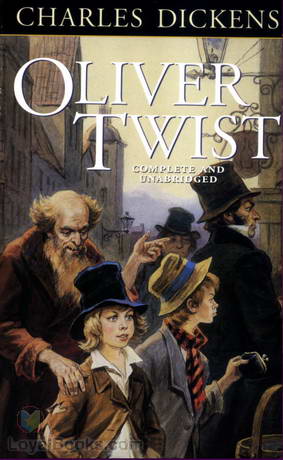
Set in the first half of the 19th century, the classic novel presents the story of young orphan Oliver Twist, who endures tumultuous events in a society burdened by poverty, crime and malice. After being poorly treated in a workhouse, Oliver escapes to London where instead of finding a better life he ends up tangled in a web of criminal activities.
The novel opens with the introduction of Oliver, a waif who has spent his short life living in miserable conditions in a workhouse. Along with other fellow orphans, he is regularly beaten and underfed. One day the young, hungry orphans decide to draw sticks in order to determine who will ask for another portion of gruel. The unlucky representative of the starving children is Oliver, who goes up to the stern Mr. Bumble and makes his famous plea “Please sir, I want some more”. Unimpressed by such a request, the authoritarian administrators of the workhouse offer five pounds to anyone willing to take the boy as an apprentice. Subsequently, Oliver is apprenticed to local undertaker, Mr. Sowerberry.
Things do not get any easier, as Oliver is bullied by fellow apprentice Noah Claypole who also causes him to be unfairly flogged by their superiors. Consequently, Oliver decides to run away and is quickly on his way to London where he meets a boy his own age by the name of Jack Dawkins. Unaware that his new found companion is a pickpocket, Oliver naively follows Jack to the house of his benefactor Fagin where he is offered shelter. He is also oblivious to the fact that Fagin is in reality a criminal who trains young boys in the art of pick pocketing. Oliver is swept up in the corrupt game mastered by Fagin, and once again must escape the grasps of captivity in order to find happiness.
Apart from creating a brilliant piece of literature, Dickens has also documented a significant time in social history. Exploring troubling issues of the time including child labor, treatment of orphans, and child recruitment into the criminal world, Oliver Twist is one of the earliest examples of a novel exploring social criticism.

Other Audiobook
Audiobook: Favole di Jean de La Fontaine: Libro 10
Nei 12 volumi delle “Favole” (1669 – 1693) Jean de La Fontaine rinnovò la tradizione
Audiobook: Confessions (Outler translation)
Confessions (Latin: Confessiones) is the name of an autobiographical work, consisting of 13 books, by
Audiobook: Girls of Gardenville
It is pleasant to have another book about a group of merry, natural girls, who
Audiobook: Lost God
The first-century scholar and historian Plutarch tells a strange tale of sailors at sea, who
Audiobook: Rescue from Death, with a Return of Praise
A sermon, preached after the cessation of the 1625-1626 plague in London, where “from above
Audiobook: Bunyan Characters Volume II
This is the second volume of four which goes into the details of Characters from
Audiobook: Insect Adventures
This book is composed of selections from Alexander Teixeira de Mattos’ Translation of Fabre’s “Souvenirs
Audiobook: Adventures of the Teenie Weenies
The Teenie Weenies are people two inches tall who live under a rose bush with
Audiobook: The Life of Cicero
Marcus Tullius Cicero (106-43BC) was an orator, statesman, philosopher and prolific correspondent, who rose as
Audiobook: Dinner Club
Herman Cyril McNeile, better known as Sapper, was one of England’s most popular fiction writers
Audiobook: Recollections of the Civil War
Recollections of the Civil War records the events that took place during the American Civil
Audiobook: Descubrimiento del río de las Amazonas
Casi cincuenta años después del descubrimiento del Nuevo Mundo, una avanzada del imperio de Carlos